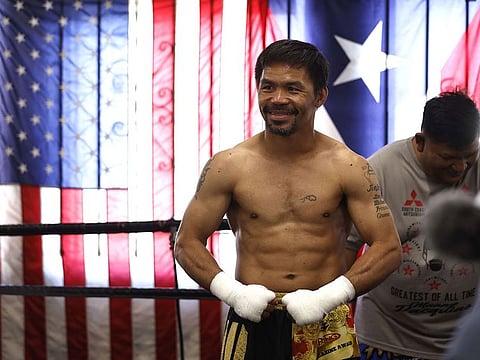Why Manny Pacquiao may not be the hero the Philippines needs
A celebrity presidency not likely to help the country in a major way at this time

Manny Pacquiao is running to be president of the Philippines. In a country obsessed with celebrity culture, the candidacy of its most famous son feels as inevitable as night following day. That’s reason enough for caution.
Pacquiao, or “Pac-Man,” is rightly regarded as a hero. A lightning-quick boxer of exceptional aggression and bravery, he is the only man to have held titles at eight different weight divisions, and ranks among the greatest of all time in his sport.
The 42-year-old also has a compelling life story, having grown up in extreme poverty in the southern Philippines. Pacquiao presents himself as a champion of the poor and has been feted regularly for his philanthropy. What’s not to like?
Plenty, actually. There’s his lack of legislative accomplishment as a congressman and senator. Whatever the candidate’s personal qualities and good intentions, a Pacquiao presidency may not help the Philippines.
A small vignette serves to illustrate the nature of the country’s choice. The news of Pacquiao’s candidacy brought back memories of a pair of interviews that this writer attended during the 2010 campaign, and the contrast they evoked.
The first was with Benigno “Noynoy” Aquino, at the family’s house in Quezon City. Although political royalty, Aquino was a reluctant candidate who entered the race on a wave of nostalgia for his mother, former President Corazon Aquino, following her death from cancer. Better known as Cory, she had toppled Ferdinand Marcos in the “people power” revolution of 1986.
The informal atmosphere and relative modesty of the surroundings were striking. The arrival of a stranger with a suitcase might reasonably have been regarded as a security risk, in a country where political violence is far from unknown (Noynoy’s father, a Marcos critic, was assassinated three years before his mother’s victory).
No one seemed bothered. The freshly arrived journalist from Hong Kong was ushered into the living room, suitcase and all. It was a homely space, decorated with still-life pictures of flowers and fruit painted by Cory Aquino.
As an interviewee, Aquino didn’t demonstrate any notable eloquence. In a follow-up discussion in a back room, after the TV cameras had gone, he appeared more interested in talking about the iniquities of his rival, Manuel Villar, than painting a vision for the country he was about to lead.
The second interview was with Pacquiao, who was then supporting Villar. The bureau got word that Pacquiao would be shooting a campaign commercial at one of the tycoon’s properties in downtown Manila, and there might be an opportunity for a brief meeting once they had finished.
An ostentatious vibe
No one was unfriendly, but the vibe was ostentatious. Once free to talk, Pacquiao himself created a positive impression, coming across as softly spoken, humble and sincere as he outlined his campaign for congress and desire to help the poor.
Pacquiao’s endorsement wasn’t enough for Villar. Aquino won easily and went on to become a successful president. It isn’t an unblemished legacy, and his failure to improve infrastructure and tackle law and order arguably enabled the turn toward Duterte.
But the Philippine economy performed well during his tenure, the country gained investment-grade status from credit-rating agencies, and its ranking on Transparency International’s Corruption Index improved. Aquino died in June at the age of 61.
There may be a lesson here. Reluctant leaders can sometimes make the most effective ones. Unburdened by egos, they may be more inclined to delegate to technocrats, more concerned with the soundness of policies than personal glory, and less dogmatic.
More charismatic leaders may prove distractions who satisfy a celebrity-loving people’s need for drama without tackling the more important underlying issues of development. The Philippines has been down this road before.
Pacquiao isn’t among the front-runners in opinion polls, but it would be dangerous to discount a candidate with his fame — or the vast wealth that his boxing career has generated. At the same time, he isn’t the only candidate with a rags-to-riches story, as Mark Thompson, a professor of politics and director of the Southeast Asia Research Centre at City University in Hong Kong, noted.
Isko Moreno, a former trash collector and (naturally) movie actor, also has the advantage of a record of accomplishment as mayor of Manila, where he “can point to the competence he demonstrated during the Covid-19 pandemic,” Thompson said.
Having broken with Duterte, the biggest significance of Pacquiao’s candidacy may be to divide the vote of the ruling PDP-Laban party and thereby allow the return to a more progressive political agenda.
Matthew Brooker is a columnist and editor
Bloomberg
Sign up for the Daily Briefing
Get the latest news and updates straight to your inbox







